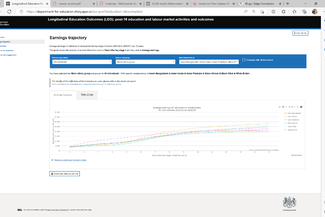This exciting new ‘dashboard’ from DfE uses the LEO dataset to track 3.6m individuals who did their GCSEs in England between 2002 and 2007. It draws on previously published analysis that tracks these individuals after they completed compulsory education over a 10-15 year period.
The analysis shows comparisons by various different socioeconomic, demographic and education factors. It has splits by Free School Meals (FSM) eligibility, Income Deprivation Affecting Children (IDACI quintile, minor ethnic group, special educational needs (SEN) status, gender, region, first language and key stage 4 attainment. There is an additional split by education level (graduates versus non-graduates and level 3 to 5 versus level 2 or below) if you wish to see differences within (broad) education levels (select ‘choose a population’).
The interactive tool
I strongly believe that this data has wide-reaching implications across the education system, but is often difficult for busy colleagues to access and interpret. I wanted to address this and make it more accessible and easy to use. We designed an R-shiny interactive tool which allows individuals to look at two things:
- Main activities: education and labour market yearly activities over 10-15 year period after Key Stage 4 (KS4)/GCSEs.
- Earnings trajectories: of those in employment over 10-15 year period after KS4/GCSEs.



Anyone can go in and choose the group they are interested in, then create charts (earnings or ‘main activities’) and even download the data. I am hoping it gets more exposure to the data and increases impact of the analysis. I believe it is a good exemplar of what can be done with LEO data (and education admin data) and am hoping it will be useful outside DfE for a range of individuals.
The LEO dataset
The LEO data extract connects education administrative data with employment and earnings and out of work benefits administrative data. You can find out more about the dataset here.
It was made available to external researchers via the Office of National Statistics Secure Research Service (ONS SRS) by the DfE in 2022.
Capacity and capability building of external researchers in the LEO data
Administrative Data and Research UK (ADR UK) is funding a partnership between the Centre for Education Policy and Equalising Opportunities (CEPEO), University of Warwick, Institute for Fiscal Studies (IFS) and DfE to develop and enhance the LEO data.
The overall objective is to enhance usability and usefulness of LEO data, by:
- Creating and making available via SRS new research-ready datasets
- Building capacity in the knowledge, understanding and analysis of LEO data, especially amongst early career researchers
- Working with policy colleagues to identify, address and disseminate answers to important policy-relevant research questions using LEO
If you are interested in the LEO data please use the interactive tool and or get in touch.
Oliver Anderson is social scientist with 15 years’ experience, of which almost 10 years is education analysis. He is an employee at the DfE but will soon be joining the CEPEO on a 12 month secondment.
If you want to find out more about the current and future skills needed in the labour market, Edge’s Skills Shortages Bulletins are available here.
